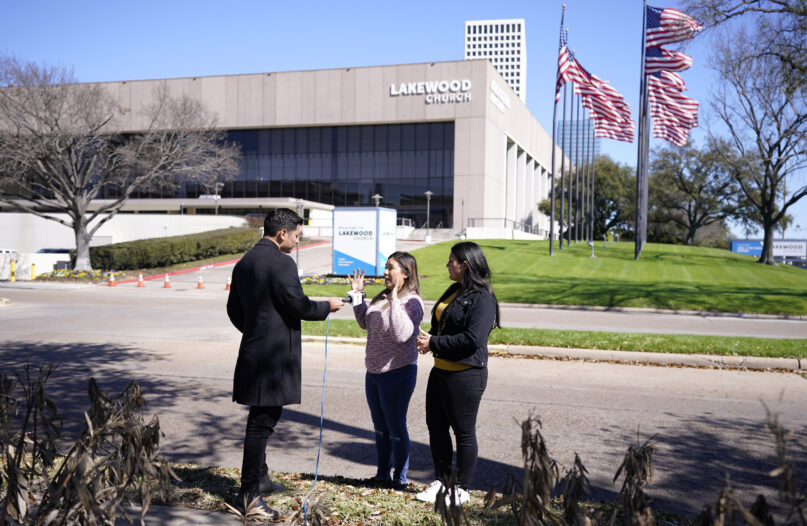HOUSTON (AP) — Nearly a week after a woman opened fire at celebrity pastor Joel Osteen’s Texas megachurch, there are still questions about a motive behind the attack and scrutiny on how a person with a record of criminal misdemeanors and a history of mental illness was able to obtain her weapons.
Police said Genesse Moreno used a legally purchased AR-style rifle in the Feb. 11 attack that also left her 7-year-old son and a man at the Houston church seriously wounded. The attack ended when she was gunned down by security.
Law enforcement and church officials were relieved the number of dead and wounded was not significantly higher. The shooting happened in a hallway just before the start of a service and never reached the main sanctuary.
In a video message posted on social media, Osteen said Sunday’s 11 a.m. service would celebrate a “time of healing and restoration.”
“It’s been a difficult week, something we never dreamed we would have to deal with. But we look back now and we see the faithfulness of God and how he protected and watched over us,” Osteen said.
Here’s what to know about the shooting:
WHAT HAPPENED ON FEB. 11?
Moreno drove up to the massive church, formerly the home of the NBA’s Houston Rockets, just before 2 p.m.
Wearing a trench coat and backpack, she pointed a gun at an unarmed security guard to get in the building and then opened fire. Moreno also carried a .22 caliber rifle that police said she did not use.
Moreno was killed in exchange of gunfire with security — a Houston police officer and an agent with the Texas Alcoholic Beverage Commission. Her son Samuel, who Moreno brought with her to the church, was struck in the head. A man in his 50s was shot in the hip.
Osteen was in the building but on a different floor.
WHAT WAS THE SHOOTER’S MOTIVE?
Police have released few details about a possible motive. And they haven’t said where and how Moreno obtained her rifle.
Investigators searched Moreno’s home and found antisemitic writings by her, Houston Police Commander Chris Hassig said. The rifle had a “Palestine” sticker on the buttstock, and Hassig noted Moreno’s former in-laws are Jewish.
Hassig described Moreno as a “lone wolf” who did not act as part of a larger group. He also said Moreno sometimes used both male and female aliases, but investigators had determined through interviews and past police reports that she identified as female.
Hassig noted a dispute between Moreno and her ex-husband’s family. Walli Carranza, Moreno’s former mother-in-law, said in court filings from Moreno’s 2022 divorce that Moreno threatened people with guns and was careless with how they were stored. That included keeping an unlocked gun in her son’s diaper bag and threatening to shoot her ex-husband while their son slept in the back seat of their car.
In an interview with The Associated Press, Carranza said her warnings to authorities and church staff about Moreno’s mental health struggles went nowhere.
Church spokesperson Don Iloff said records show Moreno “sporadically” attended services at Lakewood for a couple years but there were no records of her being at the church after 2022.
Moreno’s criminal history included charges of forging a $100 bill, a 2009 assault conviction for kicking a detention officer — which resulted in a 180-day county jail sentence — and a 2022 misdemeanor count for unlawfully carrying a weapon.
HOW WAS SHE ABLE TO BUY THE RIFLE?
Texas has few restrictions on buying and owning guns.
Moreno’s misdemeanor convictions would not have stopped her from buying the rifle. Her history of mental illness could have triggered federal restrictions, but legal experts said there’s not yet enough information publicly available to know.
Houston police said Moreno was put under emergency detention in 2016 but did not elaborate. In Texas, an emergency detention is not an arrest but allows an officer to detain a “person with mental illness” if they pose a “substantial risk of serious harm” to themselves or others.
Not everyone who is detained loses their right to own a gun, said Lindsay Nichols, policy director at the Giffords Law Center to Prevent Gun Violence. People in a mental health crisis can be temporarily taken into custody and released by a doctor who decides they are no longer a danger.
Texas lacks a formal “red flag” law, which generally allows law enforcement or family members to ask a judge to order the seizure or surrender of guns from someone deemed dangerous, often because of mental health concerns or threats of violence.
Wesley Wittig, a Fort Bend County District Attorney’s Office prosecutor, said Moreno’s mental health history didn’t come up in the 2022 weapons misdemeanor. He noted there isn’t a comprehensive mental health tracking system to flag such issues.
The shooting is one of many that have involved shooters who legally obtained guns despite criminal history and mental health problems.
WHO IS JOEL OSTEEN?
Osteen, 60, took the helm of Lakewood Church after John Osteen, his father and the church’s founding pastor, passed away in 1999. The church has grown dramatically under his leadership and is regularly attended by 45,000 people weekly, making it the third-largest megachurch in the U.S., according to the Hartford Institute for Religion Research.
Osteen is a leader in promoting what is known as the prosperity gospel, a belief that God wants his followers to be wealthy and healthy. He is the author of several best-selling books, including “Your Best Life Now: 7 Steps to Living at Your Full Potential.”
His televised services reach about 100 countries and renovating his church’s arena cost nearly $100 million.
___
Associated Press reporter Ben Finley in Norfolk, Virginia, contributed to this story.





